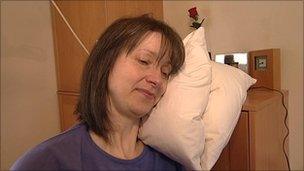Right-to-die woman Debbie Purdy campaigns for drug
- Published

Ms Purdy said she had to sleep in her wheelchair to confine her spasms
A multiple sclerosis sufferer who won a fight to clarify the law on assisted suicide is campaigning to get a cannabis-based drug for her condition.
Debbie Purdy, from Bradford, has spent a year trying to get Sativex, which is not funded by her local health trust.
Ms Purdy wants to take the drug to treat her spasms which have got so bad she is unable to lie in bed.
Bradford and Airedale NHS said in line with Yorkshire and Humber-wide policy, it did not routinely fund the drug.
In 2009, Ms Purdy won a her legal battle at the House of Lords to clarify whether her husband would be prosecuted if he helped her to end her life.
It was ruled that if he was judged to have acted with compassion he would not be prosecuted.
She is now facing a fresh fight to get access to Sativex.
The drug was licenced by the Medicines and Healthcare Products Regulatory Agency last year and is available from some health trusts.
However it has not been appraised by NICE and so the decision whether or not to fund treatment is down to local health trusts and funding boards.
'Exceptional circumstances'
A panel of regional experts in MS said there was no compelling evidence of benefits to patients from the drug and decided primary care trusts in Yorkshire not prescribe it.
Ms Purdy said she had started sleeping in her wheelchair because sleeping in bed was too uncomfortable.
"By the end of last year going to bed every night was becoming really painful because I would spasm in bed so I would throw myself out of bed."
Ms Purdy said she had inquired about getting the drug privately but could not afford the cost.
"I don't have that kind of money and I can't find a way to raise that kind of money on a permanent basis.
"Other people have got the same problem as I have and can't find the drugs that are available."
A spokesperson for NHS Bradford and Airedale said patients could go through an appeals process.
"If a doctor or consultant feels a patient has exceptional circumstances for needing a certain treatment or procedure then they can make a request to the local clinical priorities committee.
"This is a standing committee and has both lay and clinical representation, which considers individual cases with exceptional clinical circumstances."
- Published14 September 2010
- Published20 July 2010
- Published1 July 2010